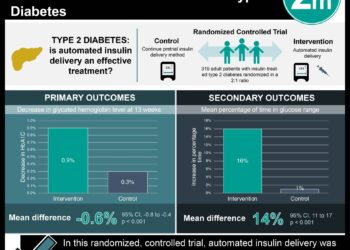Wellness Check: Nutrition
1. This systematic review found that non-diabetic patients with obesity who received glucagon-like peptide-1 receptor agonists (GLP-1RAs) had significantly reduced body weight, body mass index, waist circumference, and waist-to-hip ratio but not total body fat, compared to control groups.
2. Overall, the relationship between GLP-1RA dose and weight loss was non-linear, but the dose-response relationship varied based on the specific GLP-1RA.
Evidence Rating Level: 1 (Excellent)
Obesity affects a large population of patients globally and has many associated morbidities. Many pharmacological and lifestyle interventions have been trialed for the treatment of obesity. Glucagon-like peptide 1-receptor agonists (GLP-1RAs) have demonstrated weight loss effects in patients with diabetes. However, the impact of these medications on weight loss in non-diabetic patients is not well understood. This study assessed the results of randomized control trials to evaluate the effect of GLP-1RAs on weight loss in non-diabetic patients.
This meta-analysis included 41 randomized controlled trials involving 15,135 participants from database inception to January 1, 2022. Studies were included if they consisted of non-diabetic participants with overweight or obesity and were randomized to treatment with any GLP-1RAs or placebo. Studies were excluded if they were not randomized controlled trials, involved patients only with diabetes, or did not report on key outcomes. The review was conducted according to PRISMA guidelines. The primary outcomes measured included body weight (BW), body mass index (BMI), waist circumference (WC), waist-to-hip ratio (WHR), or total body fat (TBF).
The results demonstrated that compared to controls, participants who received GLP-1RAs had significantly reduced BW, BMI, WC, and WHR, but not TBF, at the end of treatment duration. Overall, GLP-1RAs demonstrated a non-linear dose-response effect on weight loss. The dose-response relationship varied based on the different GLP-1RAs used, with semaglutide appearing to be the most effective for weight loss. However, this study was limited by the significant heterogeneity between the included trials, which may have impacted the results. Nonetheless, the results suggested that GLP-1RAs have significant weight-loss effects on non-diabetic individuals with obesity.
1. In this randomized controlled trial, long-term γ-aminobutyric acid (GABA) supplementation did not change postprandial glucose response or markers of glycemic control and cardiovascular health in prediabetic individuals.
2. Furthermore, long-term GABA supplementation did not lead to the accumulation of GABA in the blood.
Evidence Rating Level: 1 (Excellent)
Patients at risk for diabetes (prediabetic patients) have impaired glucose regulation and often have elevated postprandial glucose. γ-aminobutyric acid (GABA) is a neurotransmitter produced in the body that can also be consumed from dietary sources such as tomatoes, melons, and fermented foods. Animal models have suggested a potential benefit of oral GABA supplementation on blood glucose control, but this effect has not been well studied in humans. This study evaluated whether long-term oral GABA supplementation can improve glucose control in prediabetic individuals.
This randomized controlled trial included 52 individuals aged 50-70 from the Netherlands. Participants were included if they had prediabetes and a body mass index (BMI) ≥25 kg/m2. Individuals were excluded if they had known diabetes, liver, pancreatic, cardiovascular, gastrointestinal, or endocrine diseases, used medications or supplements that could impact the results, had sensitivity to local skin adhesives, experienced >5kg weight change in the prior 12 weeks, or engaged in excessive alcohol consumption, defined as >21 glasses/week for males or >14 glasses/week for females. Participants were randomized to receive either 500mg of GABA three times daily or placebo capsules for 95 days. The primary outcome measured was glucose response after an oral glucose tolerance test (OGTT). Secondary outcome measures were markers of glycemic control (glycated hemoglobin), cardiovascular health (blood pressure, circulating triglycerides, cholesterol), and sleep quality as measured by the Pittsburgh Sleep Quality Index (PSQI).
The results demonstrated that GABA supplementation did not change postprandial glucose response, markers of glycemic control, or markers of cardiovascular health compared to controls. However, participants randomized to GABA supplementation had self-reported improvements in sleep quality, but the results were non-significant after correcting for the false discovery rate. Lastly, GABA levels in the plasma were not elevated even after 95 days of supplementation. However, this study was limited by most participants having relatively early or mild stages of prediabetes, which may have obscured the possible effects of GABA on glucose control. Therefore, further studies evaluating the effects of GABA on diabetic individuals may be warranted.
1. In this prospective cohort study, greater ultra-processed food intake was associated with higher hazards for both all-cause and cardiovascular disease (CVD) mortality in patients with type 2 diabetes.
2. Furthermore, a linear dose-response relationship existed between UPF consumption and all-cause and CVD mortality in this population.
Evidence Rating Level: 2 (Good)
Type 2 diabetes is a highly prevalent disease associated with increased mortality, especially from cardiovascular diseases (CVD). Diet significantly impacts the risk and progression of type 2 diabetes, and it is well known that higher consumption of ultra-processed foods (UPF) increases the risk of developing diabetes. However, whether consumption of UPF is detrimental in patients with diabetes is not well known. This study evaluated the association between UPF and all-cause and CVD mortality among patients with type 2 diabetes.
This prospective cohort study followed 1065 adult patients 35 years or older with type 2 diabetes living in Molise, Italy, for 11.6 years. Pregnant patients or those with type 1 diabetes or mental health and decision-making impairments were excluded. Food intake was determined through a 188-item food-frequency questionnaire, and UPF consumption was determined using the Nova classification. Overall diet quality was assessed using the Mediterranean Diet Score (MDS). The cohort was followed up for mortality from March 2005 to the end of December 2019. The primary outcomes measured were all-cause and CVD mortality, assessed by the Italian mortality registry.
The results demonstrated that greater UPF intake was associated with higher hazards for both all-cause and CVD mortality, independent of the overall diet quality. Sugary drinks, margarine, stock cubes, and biscuits were the individual UPFs associated with the highest mortality rates. The results also demonstrated a linear dose-response relationship between UPF consumption and all-cause and CVD mortality. However, this study was limited by the self-reported nature of food intake, which may have introduced bias. Nonetheless, these results suggested that UPFs are likely associated with increased mortality risk in patients with type 2 diabetes and should be considered when counseling such patients about lifestyle modifications.
Image: PD
©2023 2 Minute Medicine, Inc. All rights reserved. No works may be reproduced without expressed written consent from 2 Minute Medicine, Inc. Inquire about licensing here. No article should be construed as medical advice and is not intended as such by the authors or by 2 Minute Medicine, Inc.







